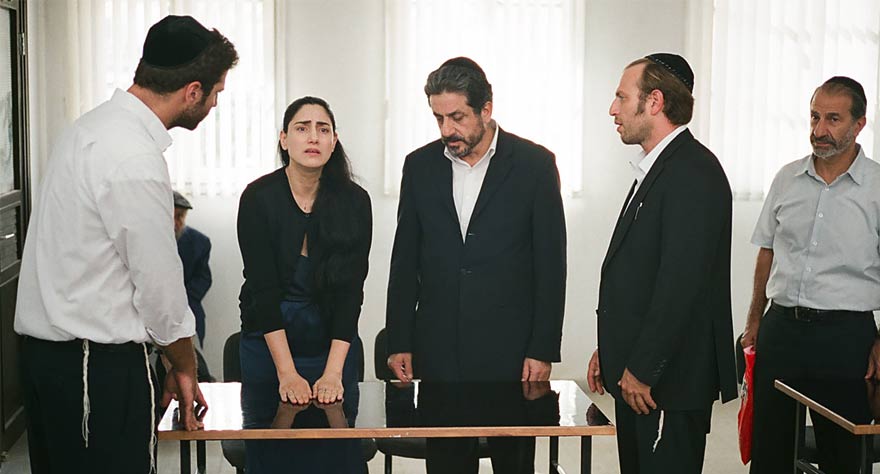
An Israeli divorce make for more riveting a courtroom drama than any murder case.


An Israeli divorce make for more riveting a courtroom drama than any murder case.

The first courtroom drama that blew me away was Otto Preminger’s Anatomy of a Murder (1959). I can remember watching it on VHS, and it just grabbed me by the lapels. I’ve watched a lot of courtroom dramas since, but the list of lapel-grabbers has been short. That list has grown by one with Gett: The Trial of Viviane Amsalem.
Ronit Elkabetz stars as Viviane Amsalem, a woman seeking a divorce from her husband, Elisha (Simon Abkarian). It sounds simple enough, but there is a huge catch: the Amsalems are Israeli. In Israel, there is no such thing as a civil marriage; all marriages are granted by Orthodox rabbis in a religious ceremony. As such, all marriages must be dissolved by Orthodox rabbis in a religious ceremony. Without the laws of man, only the laws of God – and dogma – apply. Therein lies the second catch: according to those rules, a husband must give his full consent for a marriage to be dissolved. If he doesn’t want it, she doesn’t get it. Elisha doesn’t want it.
Viviane, already trapped in an unhappy marriage, finds herself trapped again, this time in a system that stacks the deck against women and all but ignores them in the process. Still, she fights for her freedom … for five years.
Gett: The Trial of Viviane Amsalem, co-written/co-directed by star Ronit Elkabetz and her brother, Shlomi Elkabetz, is a courtroom drama like I’ve never seen before. For starters, it isn’t a courtroom drama in the traditional sense, but rather a drama that takes place almost entirely in a courtroom, with the occasional scene occurring in an adjacent waiting room. This gives the film contrasting feelings of intimacy and claustrophobia.
Some things about the film are familiar: judges on a bench, a stenographer, two tables, legal representation (Menashe Noy plays Viviane’s lawyer, Sasson Gabay plays Elisha’s), witnesses, and so on. But that’s where the comparisons to traditional courtroom dramas stop, and where the spellbinding story begins.
The film jettisons the usual melodramatic first act fodder. There are no flashbacks to happier days, nor moments of heartache that lead to a fateful decision. Instead, it opens with Viviane being denied her request for divorce. The story then jumps six months ahead to another attempt, only this time Elisha decides not to show. With no husband, the trial can’t proceed. Two months later, repeat. This continues for several more iterations and a variety of time spans between instances, and it’s so absurd it’s actually kind of funny–not haha-funny but unbelievable-funny. And that’s when the film has you, when it transcends courtroom drama and becomes something much more troubling. That’s when you realize the situation is so crazy, it must be grounded in truth.
That’s also the moment you realize a disturbing, higher-level pattern. With every attempt by Viviane to dissolve her marriage and get on with her life, she is thwarted by the male authority. Her passive-aggressive husband need only say, “No,” the divorce is not granted, and she is sent home to try to work things out with her husband. The rabbi judges (three in all, lead by actor Eli Gorstein) repeatedly reschedule the hearing without consideration for the toll it takes on Viviane. Elisha never faces consequences for his disregard for the hearings (what Americans would call “contempt of court”). The words of male witnesses carry more weight than the words of female witnesses. Even testimony meant to be first-hand observations of the couple’s marriage instead turn into evaluations of Viviane’s character.
In this culture, women are an afterthought.
Watching this is simultaneously maddening and irresistible. With every decision and every action (or inaction) that cuts Viviane again and again, she is resolute enough to continue, and with her strength and her lawyer’s courtroom skills, there is always a feeling that next time maybe–just maybe–Viviane will finally get her wish. Instead, in a gender-reversing twist, Viviane is the film’s Charlie Brown to the Orthodox court’s Lucy – and all the court does is keeping pulling that football away.
Ronit Elkabetz’s performance is unforgettable. As the woman who will not be denied no matter how many men get in her way, Elkabetz shows the weariness and frustration borne of years of roadblocks, with a layer beneath that the steely resolve of a woman undaunted. Almost as good is Abkarian as Elisha. Stoic to the point of looking bored, he plays perfectly the type of person who knows what he is doing is wrong, but rather than try to make something more emotional out of it or even do the right thing, he instead remains as lifeless as possible. This divorce is a grizzly bear, and Abkarian plays dead perfectly.
With terrific storytelling fundamentals, compelling emotional depth, and crackling dialogue, the Elkabetz siblings could be Israeli filmmaking’s answer to the Coen Brothers.
I mentioned earlier that there is no drama leading up to the divorce in Gett (which means divorce), and that is mostly true. What I did not know in advance of watching this film is that it is the third in a trilogy about Viviane and Elisha. The first is 2004’s To Take A Wife, which introduces the characters as their marriage is falling apart. The second is 7 Days, which looks at their separation. Gett brings the characters’ lives to resolution. The third installment is so good, I’m ready to binge-watch the trilogy (even though that means tracking down the hard-to-find middle film).